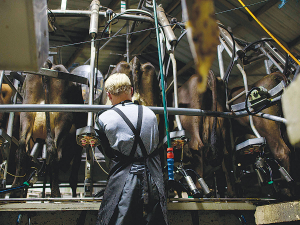DairyNZ Tests Heat Stress Solutions for Dairy Herds
New DairyNZ research will help farmers mitigate the impacts of heat stress on herds in high-risk regions of the country.
 One of the main reasons for a shift to flexible milking is to reduce hours, make rosters more flexible and improve work.
One of the main reasons for a shift to flexible milking is to reduce hours, make rosters more flexible and improve work.
With milkings typically taking around 17 to 24 hours a week per worker, many farmers have been focusing on milking smarter to reduce hours and creative ways to shorten the working week - like the 22% who report they are using flexible milking.
One of the milking reasons for a shift to flexible milking is to reduce hours, make rosters more flexible and improve work/life balance for their team.
For Taranaki farmers Daryl and Karyn Johnson, using 3 in 2 milking has seen their team's working week shortened by six hours each per week. Many farmers are also having success with a 10 in 7 milking schedule that maintains traditional morning and afternoon milking times but frees up a few afternoons each week.
Milking smarter has seen some operations introducing a maximum milking time (MaxT), which can reduce milking times without compromising production or udder health. Interestingly, leaving some milk behind in slow milking cows can increase the flow rate in the next milking, improving milking efficiency.
Fonterra suppliers recently received Insights reports showing their milking efficiency compared to similar operations, and how much time they could save by reaching 80-100% milking efficiency. The average possible saving at peak was 8 hours per week.
Align Farms in Mid-Canterbury allow their team to pick shifts, with the first pick rotating between staff, usually with the most popular shifts being morning and midday, leaving afternoons free.
Flexible rostering means the team control their working week, allowing them to pick shifts around other commitments and hobbies, while also allowing Align Farms to take on people looking for work opportunities, including part-time positions. They describe these workers as some of the smartest people, and the farm benefits from having a diverse and interesting workplace.
Reducing the hours your people work to 50 hours or less a week reduces stress, fatigue, and the risk of accidents, and helps you attract and keep good employees.
For more information visit www.dairynz.co.nz/milking
Seonaid Aitchison is DairyNZ solutions and development specialist.
The South Island Dairy Event has announced Jessica Findlay as the recipient of the BrightSIDE Scholarship Programme, recognising her commitment to furthering her education and future career in the New Zealand dairy industry.
New Zealand and Chile have signed a new arrangement designed to boost agricultural cooperation and drive sector success.
New DairyNZ research will help farmers mitigate the impacts of heat stress on herds in high-risk regions of the country.
Budou are being picked now in Bridge Pā, the most intense and exciting time of the year for the Greencollar team – and the harvest of the finest eating grapes is weeks earlier than expected.
The Real Estate Institute of New Zealand (REINZ) has released its latest rural property report, providing a detailed view of New Zealand’s rural real estate market for the 12 months ending December 2025.
Rural retailer Farmlands has released it's latest round of half-year results, labeling it as evidence that its five-year strategy is delivering on financial performance and better value for members.
OPINION: Expect the Indian free trade deal to feature strongly in the election campaign.
OPINION: One of the world's largest ice cream makers, Nestlé, is going cold on the viability of making the dessert.